Marcel Proust died a century ago on Nov. 18, 1922, leaving behind one of the most remarkable literary investigations into human nature and society.
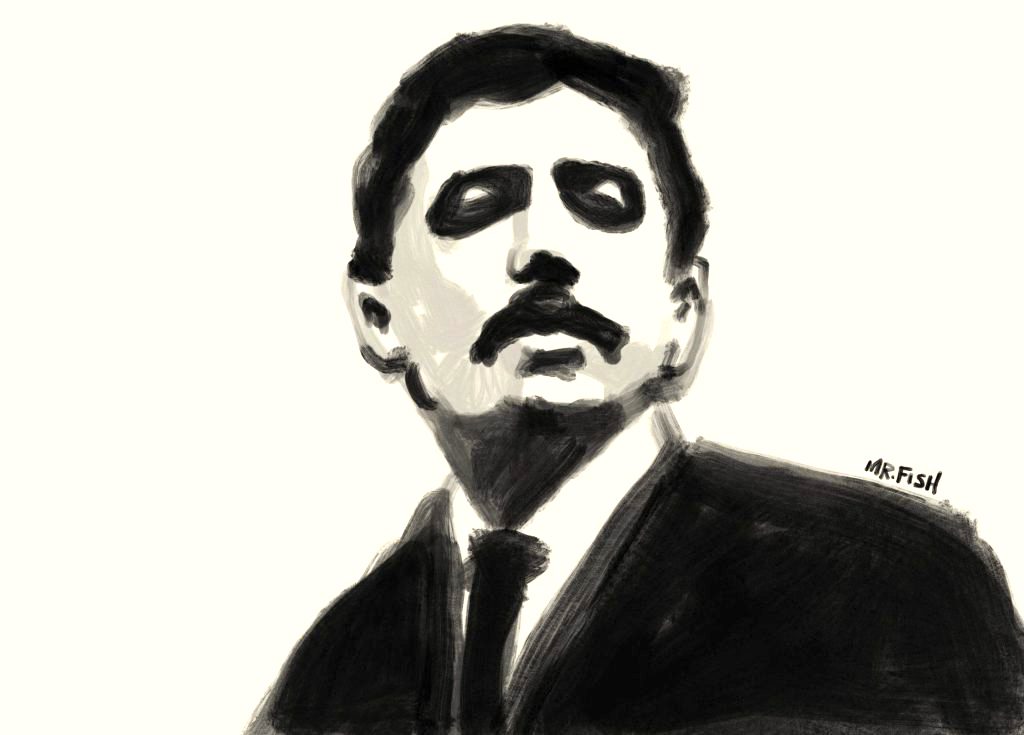
Marcel Proust – by Mr. Fish.
By Chris Hedges
ScheerPost.com
 During the war in Bosnia, I worked my way through the seven volumes of Marcel Proust’s In Search of Lost Time. The novel, populated with 400 characters, was not an escape from the war.
During the war in Bosnia, I worked my way through the seven volumes of Marcel Proust’s In Search of Lost Time. The novel, populated with 400 characters, was not an escape from the war.
The specter of death and the expiring world of La Belle Époque haunts Proust’s work. He wrote it as he was dying; in fact, Proust was making corrections to the manuscript the night before his death in his hermetically sealed, cork-lined bedroom in Paris.
The novel was a lens that allowed me to reflect on the disintegration, delusions and mortality around me. Proust gave me the words to describe aspects of the human condition I knew instinctively, but had trouble articulating.
He elucidates the conflicting ways we perceive reality, exacerbated in war, and how each of us comes to our own peculiar and self-serving truths. He explores the fragility of human goodness, the seduction and hollowness of power and social status, the inconstancy of the human heart and racism, especially anti-Semitism.
Those who see in his work a retreat from the world are poor readers of Proust. His power is his Freudian understanding of the subterranean forces that shape human existence. The novel is grounded in the bitter wisdom of Ecclesiastes: The beauty of youth, the allure of fame, wealth, success, power, along with literary and artistic brilliance, reap a horrendous toll on those beguiled by them, for they are transitory, and perish.
I was in Croatia as Serb villages were being ethnically cleansed by the Croatian army. I watched an elderly veteran of the partisan war being pushed out of his home, which he would never again inhabit, in a wheelchair, bedecked with his World War II medals on his chest. The rise of ethnic nationalism had extinguished the old Yugoslavia and with it his status and place in society.
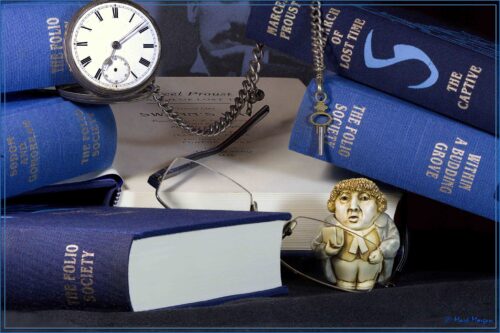
In Search of Lost Time. (Mark Morgan, Flickr, CC BY 2.0)
The last volume of In Search of Lost Time is populated with the aged shells of once-great actors, writers and aristocrats, forgotten as the crowd flocked to new luminaries.
The celebrated actor La Berma, a thinly disguised Sarah Bernhardt, too infirm to take to the stage, is ignored. The courtesan Odette de Crécy, the passion of Charles Swann, one of the central characters in the novel, was once a great beauty who entranced Paris but in senility is relegated to a corner of her daughter’s fashionable salon where she is a figure of ridicule.
She had become “infinitely pathetic; she, who had been unfaithful to Swann and to everybody, found now that the entire universe was unfaithful to her,” Proust writes of Odette.
The pedestals the powerful and the famous stand upon — and believe are immovable — disintegrate, leaving them like King Lear, naked on the heath. When Swann denounces the persecution of the Jewish army Captain Alfred Dreyfus, wrongly accused of treason, he becomes a nonperson and, along with other “Dreyfusards,” is blacklisted. Émile Zola, France’s most famous novelist at the time, was forced into exile because he defended Dreyfus.
“For the instinct of imitation and absence of courage govern society and the mob alike,” Proust notes. “And we all of us laugh as a person whom we see being made fun of, though it does not prevent us from venerating him ten years later in a circle where he is admired.”
War elucidates these Proustian truths. Death, as in the novel, permeated my existence in Sarajevo, a besieged city being hit with hundreds of shells a day and under constant sniper fire. Four to five people were dying daily, and perhaps another dozen or so were wounded. But even with death all around us, those desperately clinging to life sought to obscure its reality. Death was something that happened to someone else.
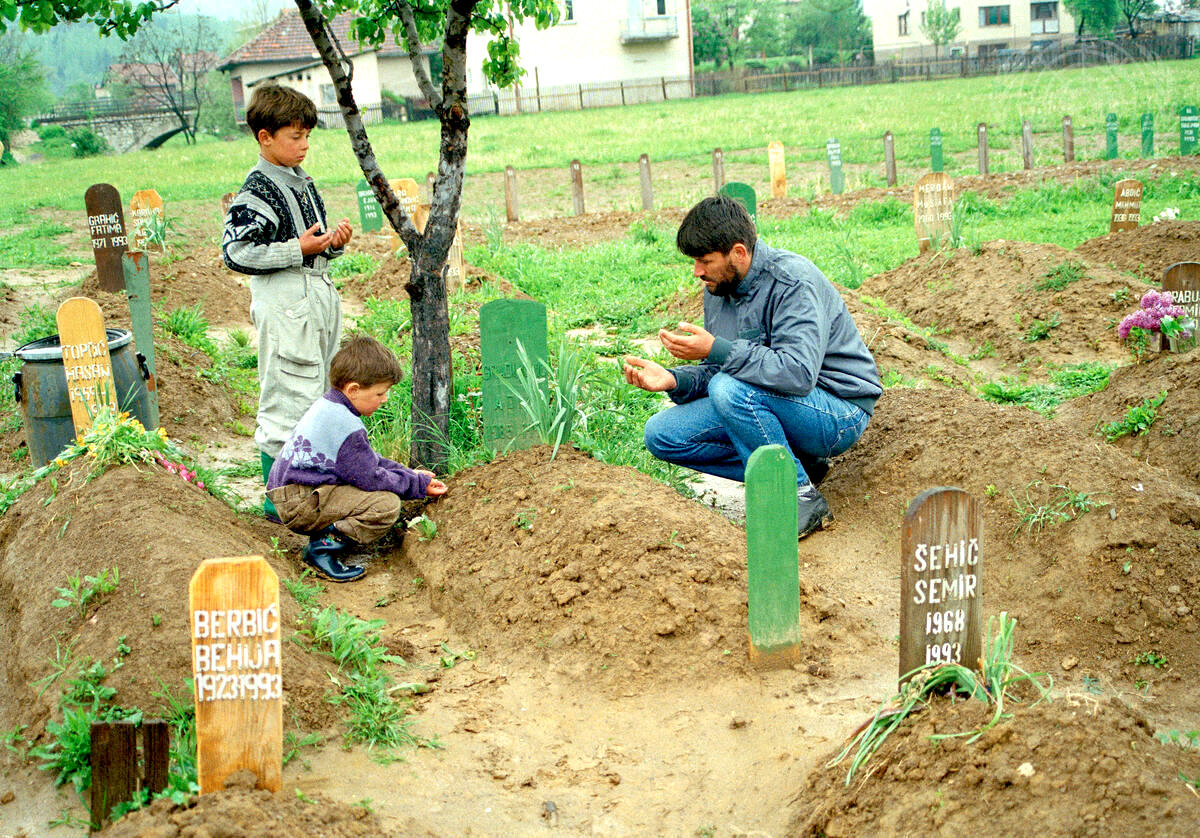
A Muslim grieving over his son’s grave in Vitez, May 1994. (UN Photo/John Isaac)
This denial of death, and our impending mortality, is captured by Proust when Swann informs the Duke and Duchesse de Guermantes that he is ill and has only three or four months to live. On their way to a dinner party and not wanting to cope with the finality of death, the duke and duchesse dismiss the prognosis as fiction. Swann warily accepts that “their own social obligations took precedence over the death of a friend.”
“You, now, don’t let yourself be alarmed by the nonsense of those damned doctors,” the duke tells him. “They’re fools. You’re as sound as a bell. You’ll bury us all!”
Mutations of the Self
The death of the narrator’s grandmother, as well as the death of his lover Albertine, a version of Proust’s lover and chauffeur Alfred Agostinelli, who was killed in a plane crash in 1914, exposes the mutations of the self. Marcel, the narrator, does not lament grief, for it retains the connections to those we have lost. He laments the day he no longer grieves, the day the self that was in love no longer exists. He writes:
“I too still wept when I became once again for a moment the former friend of Albertine. But it was into a new personality that I was tending to change altogether. It is not because other people are dead that our affection for them fades; it is because we ourselves are dying. Albertine had no cause to reproach her friend. The man who was usurping his name was merely his heir. We can only be faithful to what we remember, and we remember only what we have known. My new self, while it grew up in the shadow of the old, had often heard the other speak of Albertine; through that other self, through the stories it gathered from it, it thought that it knew her, it found her lovable, it loved her; but it was only a love at second hand.”
Inanimate objects carry within them a mystical force that can awaken these lost feelings of grief, joy and love. They return not by an act of will, but through involuntary memory. A smell, sight or a sound suddenly ignites what is buried and otherwise inaccessible, the most famous example being the dipping of the petite madeleine into the tea that evokes a sudden memory of Marcel’s childhood at Combray.
“I find the Celtic belief very reasonable, that the souls of those we have lost are held captive in some inferior creature, in an animal, in a plant, in some inanimate thing, effectively lost to us until the day, which for many never comes, when we happen to pass close to the tree, come into possession of the object that is their prison,” Proust writes. “Then they quiver, they call out to us, and as soon as we have recognized them, the spell is broken. Delivered by us, they have overcome death and they return to live with us.”
Art — literature, poetry, dance, theater, music, architecture, painting, sculpture — give the fragments of our lives’ coherence. Art gives expression to the intangible, nonrational forces of love, beauty, grief, mortality and the search for meaning.
Without art, without imagination, our collective and individual pasts are disparate, devoid of context. Art opens us to awe and mystery. Art is not, as the painter Elstir says in the novel, a reproduction of nature. It is the impression nature has on the artist. It wrestles with the transcendent.
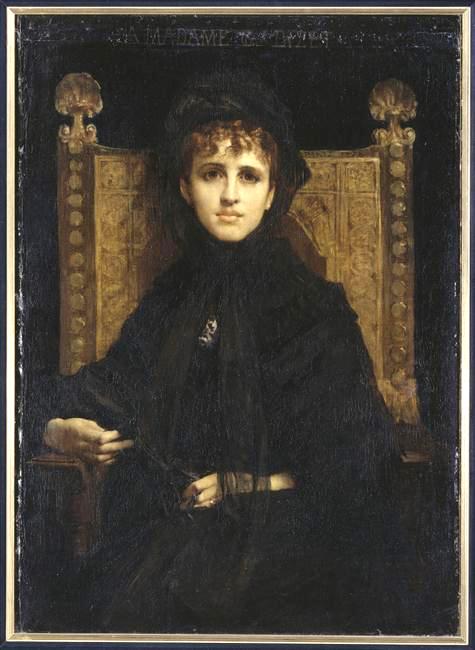
Portrait of Mme. Geneviève Bizet by Jules-Élie Delaunay, in Musée d’Orsay, 1878. She served as partial inspiration for the character of Odette. (Public Domain, Wikimedia Commons)
Imagination, however, is a blessing and a curse. It can be self-destructive when we mistake what we imagine for reality. Swann’s infatuation with Odette, for example, is driven by her resemblance to the women painted in the Florentine Renaissance by Sandro Botticelli. It is the painting, the image, not Odette that Swann worships, a fact he eventually faces, amazed that he has courted a woman “who was not my type.” Marcel will come to a similar conclusion at the end of the novel, seeing the aristocratic elites who dazzled him in his youth as mediocrities, elevated to the status of demigods by his imagination.
At the same time, imagination is the fuel of art. Art, Proust reminds us, takes work — as in the fictional piece of music, the “Vinteuil Sonata,” which Swann associates with Odette.
“Often one hears nothing when one listens for the first time to a piece of music that is at all complicated,” he writes. “For our memory, relatively to the complexity of the impressions which it has to face while we are listening, is infinitesimal, as brief as the memory of a man who in his sleep thinks of a thousand things and at once forgets them, or as that of a man in his second childhood who cannot recall a minute afterwards what one has just said to him.”
It is, he writes, “the least precious parts that one at first perceives.” He goes on,
“But, less disappointing than life, great works of art do not begin by giving us the best of themselves […] But when those first impressions have receded, there remains for our enjoyment some passage whose structure, too new and strange to offer anything but confusion to our mind, had made it indistinguishable and so preserved intact; and this, which we had passed every day without knowing it, which had held itself in reserve for us, which by the sheer power of its beauty had become invisible and remained unknown, this comes to us last of all. But we shall also relinquish it last. And we shall love it longer than the rest because we have taken longer to get to love it.”
The external world of the five senses in Proust is always defeated by the inner world constructed by imagination. Nothing could be truer in war. Those in war work incessantly to make sense of the senseless. They form stories out of chaos. They seek meaning in meaninglessness.
In a firefight you are only aware of what is happening a few feet around you. But once that firefight is over, two things happen. Those who emerge victorious from the firefight rifle through the pockets of the dead, examining the photos and documents on the bodies of those they killed. At the same time, they piece together a narrative of what happened.
This narrative is largely a fiction, for only bits and pieces are available to be cobbled together to make a coherent whole. But without that narrative, the experience, like life itself, is not bearable.
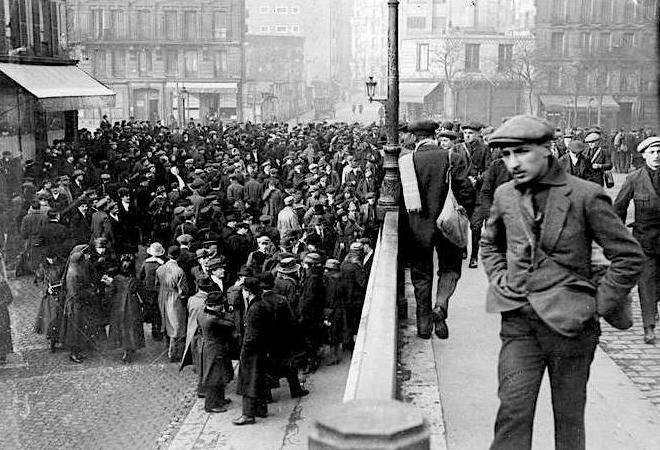
Gare Montparnasse, Paris, November 1917. (Édouard Brissy, CC BY-SA 4.0, Wikimedia Commons)
Proust chronicles the poisonous effects of World War I on French society, embodied by the hostess Mme. Verdurin, who uses the war to elevate her social prestige while the suicidal tactics of French generals leads to 6 million casualties, including 1.4 million dead and 4.2 million wounded, along with numerous army mutinies.
Generals and war ministers are celebrities. Artists are reviled or ignored, unless they produce wartime kitsch. Women adorn themselves in “rings or bracelets made out of fragments of exploded shells or copper bands from 75 millimeter ammunition.”
The rich, bursting with patriotism, while sacrificing little, busy themselves with charities for the soldiers at the front, benefit performances and afternoon tea parties. Wartime clichés, amplified by the press, are mindlessly parroted by the public. “For the idiocy of the times caused people to pride themselves on using the expressions of the times,” Proust notes.
The war eradicates the demarcation between civilians and the military. It degrades language and culture. It fuels a toxic nationalism. It ushers in the modern era of industrial war where nations turn their resources over to the military and, with it, outsized political and social power. The war, the backdrop of the final chapter, signals the end of La Belle Époque.
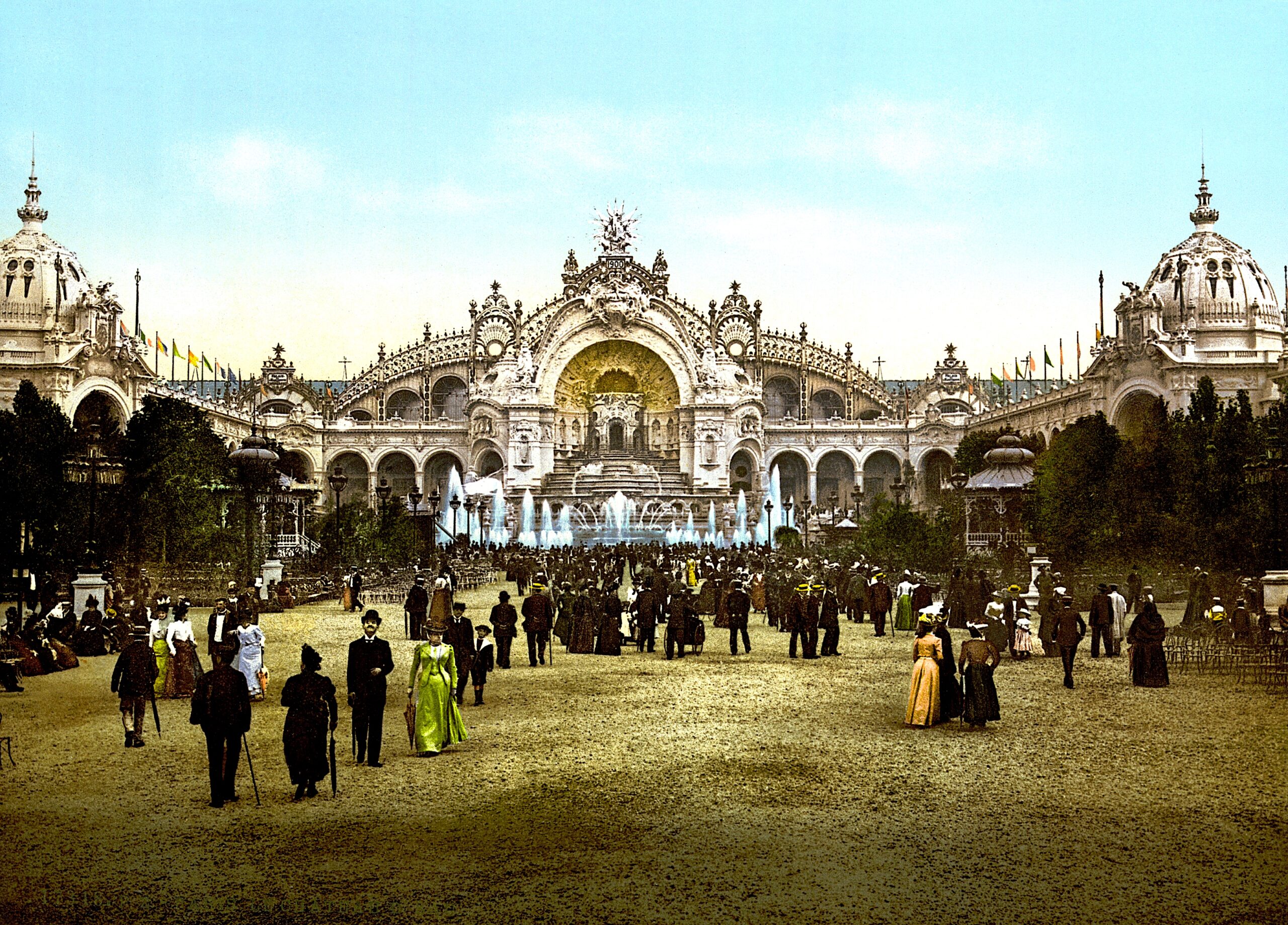
1900 World Fair in Paris during the Belle Époche. (U.S. Library of Congress, Public Domain, Wikimedia Commons)
The public fell into line with the modernists of war, “after resisting the modernists of literature and art,” Proust writes, because it is “an accepted fashion to think like this and also because little minds are crushed, not by beauty, but by the hugeness of the action.”
Proust captures the disparity between the sensory world of war and the mythic version of war that plagues all conflicts, leading to a bitter alienation between those who experience war on the battlefield and those who celebrate it in safety. Those who imbibe the myth of war engage in an orgy of self-exaltation, not only because they believe they belong to a superior nation but because as members of that nation they are convinced that they are endowed with superior virtues.
The flip side of nationalism is racism and chauvinism, for as we elevate ourselves, we denigrate others, especially the enemy. Proust, when he writes about anti-Semitism, makes an important distinction between vice and crime, a distinction quoted at length by Hannah Arendt in The Origins of Totalitarianism.
In the decadence of La Belle Époque, Jews were admitted to the great salons, until the Dreyfus affair. They were seen as exotic, albeit tainted with the vice of Jewishness. Vice is not an act of will but an inherent, psychological quality that cannot be chosen or rejected.
“Punishment,” Proust writes, “is the right of the criminal” of which he is deprived if “judges assume and are more inclined to pardon murder in inverts [homosexuals] and treason in Jews for reasons derived from…racial predestination.”
The difference between vice, which can never be removed, and crime, defines war, as it defined fascism a few years after the publication of Proust’s novel. Enemies embody evil not solely because of the acts they commit but because of their intrinsic nature. Eradicating evil, therefore, requires the eradication of all those infected with vice. The only way to survive is to renounce and hide your essence.
Jews in France converted to Christianity. Homosexuals pretended to be heterosexual. Muslims and Croats in Serb-held Bosnia pretended to be Serbs. Serbs and Muslims in Croatia pretended to be Croats.
These mutations, Proust warned, turn the blessed and the damned into caricatures easily manipulated by demagogues and the mob. The hostility to difference is an ominous step toward tyranny, either the petty tyranny of the ruling class or the larger tyranny of totalitarianism.
Proust has a dark view of human nature. Those who carry out acts of charity and kindness in the novel almost always have ulterior or, at best, mixed motives. We betray people for bagatelles. We surrender our professed morality for self-advancement. We are indifferent to human suffering. We attack the faults of others but succumb to the same faults if “sufficiently intoxicated by circumstances.”
But because Proust expects so little from us, he extends pity, compassion and forgiveness to even the most loathsome of his characters, as they fade away at the end of the novel in a danse macabre. Our inner life, he concludes, is finally unfathomable, for it is always in flux. As we age, we become shells, faded masks identifiable only by our names.
Human folly, however, is redeemed because of our childlike yearning for the impossibility of the eternal and the absolute in the face of the destructive maw of time.
Proust reminds us of who we are and who we are to become. Lifting the veil on our pretensions, he calls us to see ourselves in our neighbor. By immortalizing his vanished world, Proust exposes, and makes sacred, the vanishing world around us.
His perceptions were a balm, a deep comfort, in the madness of war, where the mob bays for blood, death strikes at random, delusion is mistaken for reality and the impermanence of existence is terrifyingly palpable.
Chris Hedges is a Pulitzer Prize–winning journalist who was a foreign correspondent for 15 years for The New York Times, where he served as the Middle East bureau chief and Balkan bureau chief for the paper. He previously worked overseas for The Dallas Morning News, The Christian Science Monitor and NPR. He is the host of show “The Chris Hedges Report.”
Author’s Note to Readers: There is now no way left for me to continue to write a weekly column for ScheerPost and produce my weekly television show without your help. The walls are closing in, with startling rapidity, on independent journalism, with the elites, including the Democratic Party elites, clamoring for more and more censorship. Bob Scheer, who runs ScheerPost on a shoestring budget, and I will not waiver in our commitment to independent and honest journalism, and we will never put ScheerPost behind a paywall, charge a subscription for it, sell your data or accept advertising. Please, if you can, sign up at chrishedges.substack.com so I can continue to post my Monday column on ScheerPost and produce my weekly television show, “The Chris Hedges Report.”
This column is from Scheerpost, for which Chris Hedges writes a regular column. Click here to sign up for email alerts.
The views expressed are solely those of the author and may or may not reflect those of Consortium News.

Nice one, Mr. Hedges. As the talking heads on the mass media channels are wont to say these days, “thank you so much, ‘preciate it”. When I was in my twenties, in the sixties, two things changed, I might say, saved, my life, One was reading Proust and the other was a simple little sugar cube. Cheers. B.
Great article, Mr. Hedges! It makes me want to read Proust! Or listen to the audiobook version!
dear Chris, I believe in all you have written about Proust, the imagination, time past, present, etc.
Also I follow your writings and interviews whenever I find them. I have loved Proust for many years. His book changed my life! which I will not go into details. As a mother and now a grandmother, Proust’s bonding with his, means more to me than ever. I share with you religious background in a way. I was a member of Maryknoll Catholic women’s community, left to marry, have a family and found a new vocation in the arts, i.e. poetry. Thank you for sharing your journey. Blessings on Thanksgiving and on into the future. As we say in the Mass . . . Peace be with you (and may Peace come to our world). Sincerely, Carolyn Grassi
thanks Chris for all your writings and interviews on behalf of peace! I’ve read Proust several times. He changed my life for the better.
Am so grateful for your article here. My friend the late poet James Merrill was devoted to Proust! Here is a poem of mine for peace.
AMERICA’S ENDLESS WARS ABROAD (2007-2022)
By Carolyn Grassi (author: Brooklyn Beginnings by C.G.,
Afterword by James Torrens S.J.)
How is it that those in power apparently proceed
without doubts about “their cause,” wrecking
havoc in countries they invade and even in
the face of their own people’s revolt,
street protests, letters to the president and
Congress. Will they admit their mistakes?
Unlikely, so our men and women serving in
the military will continually be placed
in harm’s way. And those countries, such
as Iraq, will suffer our so-called “liberation,”
since our government decides what is best for
Iraq’s Sunni and Shiite. Thus, suffering and
dying continue, due to America’s sense of
superior enlightenment’s deep-rooted hubris
brushing, as it were, devastation under the rug
thanks to our supposedly noble good intentions.
After all, the U.S. brags to other countries . . .
“We are the finest nation ever in the world.”
Exceptionalism continually preached so
wherever we wish to go full force presence,
or proxy lethal wars abroad. Though back
home we will not see the wounded, the dead
that our military harms, neither will we witness
those brought home suffering from PTSD,
others hospitalized due to major injuries . . .
A silencing censorship prevails within
the mass media. Worse with every war,
as currently arming Ukraine against
Russia is the latest deadly enterprise.
Give more and more money, weapons,
technology, whatever pleases the military-
industrial complex, whom our elected
officials bow to please. Rare or rare it is
today more than ever are voices for peace,
negotiation heard . . . after all, aren’t we
“liberating” for democracy’s cause, like
we did in Vietnam, Iraq, Libya, Syria,
Afghanistan . . . Once again America to
the rescue, as elected officials, the mass media,
join together in cheering applause: Hurrah! (Horror!)
“Reading is that fruitful miracle of communication in the midst of solitude.” Marcel Proust
Not for nothin; but, how far “off the chart,” is Hedges’ level of comprehension?!? Seven (7) Volumes in how many Years!!! It can take decades, to “work” through Proust. Granted, “levels of comprehension” vary per one’s level of education, experience (f/crucial); and, “the complexity of the subject;” BUT, PROUST!!! SCORE! Marcel Proust’s “esprit pour la vie“ lives! TY, Chris Hedges.
– “Your job is to read, read, read and occasionally write.” Gerald Stern to Chris Hedges.
“PROUST reminds us of who we are and who we are to become. Lifting the veil on our pretensions, he calls us to see ourselves in our neighbor.” Likewise, Hedges’ writing, “HE, Gerald Stern, DESPAIRED of The DECLINE of LITERACY and the ravages of the technological age, which he saw as intellectually, artistically and morally impoverishing. He believed the computer debased the poet as he or she “joined the company of scholars, secretaries, and petty businessmen.”
– “A child in Camden could teach the proud missile makers a lesson,” he said. “‘Take my hand,’ the little Camden child says, ‘and walk with me. Walk my streets to school. Will your bombs save me? If you want to defend me, come and live on my block.’” (FATHER MIKE DOYLE )
– What about ART? Marcel Proust, “The particulars of life do not matter to the artist, they merely provide him with the opportunity to lay bare his genius,” i.e., MR. FISH!!! “Only through art can we emerge from ourselves and know what another sees.” (MARCEL PROUST)
“Comprenez vous?” “Capisci?” “Lo entiendes?” “Do you understand?”
“Sometimes I see men and women hardened by time and all washed out like the hills of Appalachia and I wonder what were their first few years of life and what happened in the little places where they played,” (FATHER MIKE DOYLE)
“It’s universal, “a bird that is not flying cannot discover where there is harvest.”
Imo, PROUST via HEDGES/FISH, is “The Jab,” the Universe needs, to grasp wtf is propaganda or not! AND, coping vs. copping out, in this $hituation, i.e., “The land of the free and the home of the brave, is a f/war zone!!!” Ciao TY, Hedges, Mr. Fish, CN, et al., In Joy,
“BOLERO” by Gerald Stern
hxxps://www.poetryfoundation.org/poetrymagazine/poems/42333/bolero
Thank you for the insight, reflection, and the encouragement that we are not alone observing the mud of war.
dear Chris, a bow of thanks for writing about Marcel Proust. I’ve read his Remembrance of Times Past twice, each time, was transformed into an organic world of love, loss, compassion, recovery. Proust was a write that my friend, the late poet James Merrill, was especially devoted to. Thanksgiving thanks, Chris, for all your writings and interviews. Below is a poem of mine sent to you,
knowing you’ll understand. on the journey, blessings, Carolyn (in California)
PALMYRA, SYRIA
(from my book: Brooklyn Beginnings
Poems by Carolyn Grassi Afterword by James Torrens S.J>
At a distance. via a few photos on TV. ISIS is seen
erasing the Syrian people’s past by destroying
Palmyra’s Temple
of Baalshamin,
blasting this 2000 year old sacred site of worship
where countless people offered incense, flowers,
while carrying in
their sick for healing,
leaving the ashes of loved ones in alcoves, calling on
ancestral spirits in rituals, a people who’ve endured
droughts, desert storms,
earthquakes, fierce conflicts
over centuries, their temple walls surviving decades,
centuries, until now: 2015 such a shocking sight:
Palmyra crumbling as
casualty of a prolonged
war aided and abetted by foreign powers, as U.S.A.
with Saudi Arabia fighting through proxies to gain
hegemony against Iran,
Russia and Bashar Assad,
head of Syria, so in the chaos ISIS strafes Palmyra with
machine-guns, bombings, defacing, defaming this
site to smithereens,
killing people seeking
safety in crumbling shelters, as the director of Palmyra’s
ancient antiquities, Khaled al-Asaad, is tortured since
he refuses to disclose
where precious artifacts
are hidden, a silence costing his life as a U.S. news brief
mentions his head displayed on a pillar of the destroyed
temple he tried save,
while we in America
went along our merry way as if nothing was happening
on the other side of the world where our money helped
fund this civil war
offering military advisers
ignoring how Saudi Arabia and Turkey allowed ISIS to
pass through their lands to fight in a Syrian civil war,
while the U.S. continually
preached to Europeans
they should welcome asylum seekers, as if we had
nothing to do with this tragedy, so refugees pay
smugglers for passage
to reach Europe, or if
without funds, they slip into run-down Turkish camps,
though Germany’s Angela Merkel publicly pledges
to welcome 800,000 refugees,
England offers 20,000 a haven,
France 24,000, and the U.S. 25,000 over four years!
while we’re a major supporter of this war sending
4 billion dollars in military
equipment and training,
by following Bush in destabilizing the Middle East
with invading Iraq, executing Saddam Hussein,
suppressing U.S.’s role
supplying nerve gas
to Iraq for its war against Iran, though peace activists
petition President Obama to take in refugees, few
public demonstrations
before the While House,
not wanting to offend or criticize a liberal administration,
that at the start failed to face international accusations
of war crimes by Bush,
Cheney and Rumsfeld,
a placating message: “Let’s not look back, but ahead,”
thus the perennial U.S. refusal to take responsibility
for harming other
countries’ people,
forget restitution, instead perpetuating the myth of
American exceptionalism proudly professed to all . . .
Thank you. A remarkable and insightful look at the utter banality that underlies the horror and lunacy of war.
“Proust captures the disparity between the sensory world of war and the mythic version of war that plagues all conflicts, leading to a bitter alienation between those who experience war on the battlefield and those who celebrate it in safety. Those who imbibe the myth of war engage in an orgy of self-exaltation, not only because they believe they belong to a superior nation but because as members of that nation they are convinced that they are endowed with superior virtues.” [Chris Hedges]
In Washington, the politicians who plan, push for and finally create war are invariably those who have spent their lives keeping themselves safely out of harms way, too valuable no doubt to be lost in the dirt and blood of conflict. Biden for example, 6 deferments, followed by a mediocre career as a me-first, politician for life, all so he could foment, with no hyperbole, a war to end all wars, and all of us with it. Humanity brought to its knees by the most mediocre among us.
I cannot think of a single neocon or neodem that is not a self-serving chicken-hawk who meticulously keeps him or herself safe while working full time to send others to suffering and death. Why? No grand plan, they simply want to. It makes them feel important. As if any fool cannot destroy things; building and nurturing something of value is what takes real talent and ability, talent and ability that our neos will never have. Washington may not be the only source for such pathetic trolls but it is certainly the mother lode. Not seeing through the pathetic charade of these vacuous actors will kill us all.
Well said and thank you.
Ditto.
Excellent response, left with little to add.
Thank you for the kind replies. I wish we could speak about nicer things.